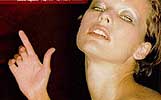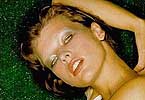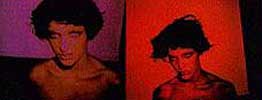Axcess May 1997
 Thoroughly Modern Milla
Thoroughly Modern Milla
More than just a pretty face, model/actress/singer Milla Jovovich has something to say
by Alison Rosen
 Right now, model/actress/musician Milla Jovovich, 21, is
attempting the impossible. With one hand, she's awkwardly trying
to anchor the hem of a barely-there skirt in a valiant attempt to
cover her barely-there ass. With the other, she's doing all sorts
of model-type things, like pointing and gesturing and beckoning.
All the while, she's bending her lithe body into weird positions
(she's into "shapes", she tells me) and making love to the camera.
And looking sassy. And intriguing. And natural. We just saw her
ass.
Right now, model/actress/musician Milla Jovovich, 21, is
attempting the impossible. With one hand, she's awkwardly trying
to anchor the hem of a barely-there skirt in a valiant attempt to
cover her barely-there ass. With the other, she's doing all sorts
of model-type things, like pointing and gesturing and beckoning.
All the while, she's bending her lithe body into weird positions
(she's into "shapes", she tells me) and making love to the camera.
And looking sassy. And intriguing. And natural. We just saw her
ass.
She stops cavorting and pulls up to her full height of 5'7", lanky arms limp at her sides. "Who's gay?" she asks the small and mostly male group assem- bled at today's photo shoot. There's a collective pause and a few surprised "what's she doing?" glances are exchanged. A couple hands go up. "Cause if people are gay, then I don't mind the skirt coming up," she explains. "I'm gay, then," says the straight photographer.
Milla Jovovich, you see, is a piece of meat. A model since age 11, she's used to being pinched and prodded and styled and used. She has "the face," and therefore people talk about her, in front of her, as if she's not there. As if she belongs to the public.
But she's also an artist. She recently saw a picture by a friend of a girl wrapped up in fishing wire, with flesh alternately bound and popping. She loves this photo, and sees the fishing wire as her own insecurities. She wrote a song about it. She makes music so beautiful you wonder how it came from a fashion model.
 And she acts, too, and takes it very seriously (though she'll
readily admit to having taken roles in "shitty" movies). She's starring
alongside Bruce Willis and Gary Oldman in the futuristic "scifi-action-
comedy-drama" The Fifth Element, directed by Luc Besson (The
Professional,La Femme Nikita). It's the opening film at the 50th Annual
Cannes festival, and opens stateside May 9.
And she acts, too, and takes it very seriously (though she'll
readily admit to having taken roles in "shitty" movies). She's starring
alongside Bruce Willis and Gary Oldman in the futuristic "scifi-action-
comedy-drama" The Fifth Element, directed by Luc Besson (The
Professional,La Femme Nikita). It's the opening film at the 50th Annual
Cannes festival, and opens stateside May 9.
When modeling, she gyrates, poses and languishes with the laid- back demeanor of a veteran. She creates different moods by talking to no one in particular: "You talking to me?" and "Hey, motherfucker!" seem to do the trick. But there's something slightly surreal about the whole show. She's definitely into it, yet she's definitely making fun of it.
She jokes that she's obsessed with clothes, and claims to stick with modeling only "to make money so I can get my clothes, not to have to pick shitty movies to be in, and not have to listen to my record company."
She has a certain swagger to her, a certain posturing. She uses words like "dope" and "fresh", and when these aren't good enough might even throw a "fucking" in there for good measure. Her mother reminds her, in Russian, to watch her language. She claims she picked up her bad habits from hanging with the "homeboys." She's trying hard to pass herself off as hardened and callous. I don't buy it.
"My friend shoots pictures, and he puts so much heart and so much passion into it, and when he shoots fashion he takes it so seriously, and I'm like, 'Dude, it's *fashion*. All they're going to see is the clothes. Don't put so much heart into it because today it's the best story in the world and the next month nobody remembers it.' It's the same with people. They open their hearts in an interview, and people read it, and tomorrow they forget about it, so what's the point of being personal?"
 Milla Jovovich is incredibly smart and incredibly aware, and
despite the pose, feels things on levels you probably don't even have.
Milla Jovovich is incredibly smart and incredibly aware, and
despite the pose, feels things on levels you probably don't even have.
"I want to create. I want to learn about myself through the world. I want to soak it up and let it out. I want to maybe have one person relate to what I'm feeling, and when I cry, maybe they can cry, too, because they feel the same way... you know what I mean?"
But when she says, "you know what I mean?" she's really asking. There's something lost and searching in her ethereal blue eyes. She's trying to make a connection. It's this hyper-sensitivity, this amplified reality, that makes her appreciate her outlets all the more.
"With the music and the acting, it's about being able to get out of yourself. I mean, God! Living with yourself every day is so hard, because you have so many insecurities and weird stupid complexes about things, and you get to do a movie, and you -- even for a second -- believe that world is your world, and if somebody drops something on-set you don't hear it, because that's not part of your world, and you're so immersed in a character. It's nice, sometimes, not to have to be Milla or Stacey or Lacy or whoever the hell you are, but be a different person, and not think about the fact that you have to get home at this time."
But isn't this what modeling is supposed to be about? Surely that can't be the *real* Milla Jovovich, looking ravished and sumptuous while standing against an opulent shock of green astro-turf that's been duct-taped to a cement wall.
 "You know what it is with modeling? With certain photographers,
I can be myself, because they're artists and they capture moments."
She pauses, searching me again for that connection. "You know how some-
times you can see a picture and it's not even a picture, but you can
hear a whisper from that picture. It could be a picture of someone's
face, but you hear a train going by when you see it. It can be really
personal and really beautiful. I don't want to show myself to everybody,
you know? Because when you open up to certain people and they really
hurt you, and there's no point in opening up all the time unless you
know the person you're working with is just as passionate about his
art as you are about yourself as a person, and when I feel comfortable
enough with people then I'm myself. But most of the time, it's just
advertising a fashion -- it's just an attitude. Most of the time,
it's a brainless sort of posing, but sometimes it's really personal
stuff that makes your breath catch, because you really feel that there's
a human being there."
"You know what it is with modeling? With certain photographers,
I can be myself, because they're artists and they capture moments."
She pauses, searching me again for that connection. "You know how some-
times you can see a picture and it's not even a picture, but you can
hear a whisper from that picture. It could be a picture of someone's
face, but you hear a train going by when you see it. It can be really
personal and really beautiful. I don't want to show myself to everybody,
you know? Because when you open up to certain people and they really
hurt you, and there's no point in opening up all the time unless you
know the person you're working with is just as passionate about his
art as you are about yourself as a person, and when I feel comfortable
enough with people then I'm myself. But most of the time, it's just
advertising a fashion -- it's just an attitude. Most of the time,
it's a brainless sort of posing, but sometimes it's really personal
stuff that makes your breath catch, because you really feel that there's
a human being there."
She's articulate and mature, knowing just how much of herself to expose. At times, she seems in complete control. "I'm really honest with myself, and I could be superficial on the outside, but I know exactly what I'm doing and why I'm doing it," she claims.
But things haven't always been so rosy. Her career can be divided into two parts: pre- and post-Dazed and Confused.
The daughter of a Russian stage actress (Gallina Loginova) and a Yugoslavian pediatrician, Jovovich was born Decamber 17, 1975 in Kiev, Ukraine. The family came to America when she was five, and she began pursuing an acting career at 11. Her foray into the world of high fashion began when her photo "somehow" reached the offices of the Prima modeling agency. With her striking looks -- that surefire blend of vulnerability and sexuality, fleshed out in the body of a mere nymphet -- she ascended the ranks with dizzying speed. In her first year out, she graced over 15 covers (and we're talking big, glossy international covers), not to mention countless other shoots. It went to her head, a fact seized upon by the press at the time.
"Starting modeling young gave me a bit of an attitude. When I was a little girl, I was really bratty," she admits. But she's not apologizing, and she's changed enough that she doesn't really need to.
 She made her screen debut in 1988 with a role as Sherilyn Fenn's
younger sister in Two Moon Junction. Next came the Disney Channel's
Night Train To Kathmandu. In 1991, she starred in Return To The
Blue Lagoon -- a role for which she still gets recognized and for
which she attained the tag of being "the next Brooke Shields." At 17,
she played Chaplin's first wife, Mildred Harris, in Richard Attenborough's
Chaplin. And then came the role that precipitated her decision to
quit acting and modeling, and that she'll forever regard as the biggest
blemish on the butt of her admittedly zitty career -- that of a hippie
hanger-on guitar-playing girlfriend in Richard Linklater's Dazed and
Confused.
She made her screen debut in 1988 with a role as Sherilyn Fenn's
younger sister in Two Moon Junction. Next came the Disney Channel's
Night Train To Kathmandu. In 1991, she starred in Return To The
Blue Lagoon -- a role for which she still gets recognized and for
which she attained the tag of being "the next Brooke Shields." At 17,
she played Chaplin's first wife, Mildred Harris, in Richard Attenborough's
Chaplin. And then came the role that precipitated her decision to
quit acting and modeling, and that she'll forever regard as the biggest
blemish on the butt of her admittedly zitty career -- that of a hippie
hanger-on guitar-playing girlfriend in Richard Linklater's Dazed and
Confused.
Though her face was plastered all over the promotional materials, she only had a blip of screen time. I remember it well, and I remember wondering what the hell she was doing on all the posters. And in that meanspirited way we mere mortals get back at at fashion models, we snickered. It was like a big joke. Who does she think she is, trying to be some big movie star?
But, as I realize with a sickening thud the second she starts opening her wounds for me, no one stopped to think about how she might have felt.
"They wanted me and they begged me to do the film. They said they were going to write extra scenes into the film, because the part they wanted for me was very mysterious. She's got two lines in the movie! Yeah, she's *very* mysterious." She says it flatly, with only a hint of sarcasm. "Richard Linklater is such a sweet little teddy bear and I said, 'Okay.' I went away for three months and they kept saying, 'We're going to do it, we're going to write (more scenes),' and it never got done. Then they put my face on all the posters and I realized that the only reason they wanted me was that my face was more recognizable that the other actresses, and I got so fucking fed up. All my friends went to see the movie and were like, 'Milla, where were you?' and I was just so embarrassed and so disheartened. It's another insecurity. It just makes you feel so shitty about yourself. You wonder, 'Am I a good actress? Was I that non-striking on screen that they couldn't write any scenes?'"
Luckily she had her eggs in more than one basket. In 1994, Jovovich released the haunting album, The Divine Comedy, on EMI Records. Compared to the music she's making now, which she really describes as "really honest and really raw," she feels that her first album was a little "overproduced." But it was lauded by critics and fans alike.
"Dazed and Confused made me feel so bad about myself that I just immersed myself in music and moved to England."
She spent two years "playing little coffee bars and tiny holes in the walls" (her publicity bio refers to this as her "strenuous tour schedule" -- go figure!), until she ran out of money and returned to New York, started modeling again, and was cast in The Fifth Element. "It was so much better coming back, because I got to grow up a bit and be on my own and just live."
 As it turns out, there's an uncanny congruence between what
played out in her own life and what plays out on screen in The Fifth
Element.
As it turns out, there's an uncanny congruence between what
played out in her own life and what plays out on screen in The Fifth
Element.
At this point, we're sitting in the make-shift make-up and styling room of the studio, and Jovovich is being made up for the next shot. There are a million little conversations (between stylists and editors and the photographer and all other possbile permutations) taking place at once in the room, and they're all about her -- about her clothes and her hair (she wants it down, everyone else wants it slicked back) and her makeup. Jovovich is unfazed, concentrating her attention on using the right words to describe a movie she really believes in, directed by a man she considers one of her "best friends." She's loathe to talk too much about the film, for fear of giving anything away, but she will say this much:
"It's a beautiful film, and it's very cool and not sappy. It's a love story, in the end. It's about people forgetting what's real. I play an engineer being created to fight evil."
Jill, the make-up artist, who happens to be a close friend of Jovovich's from years ago, asks if The Fifth Element is "Blade Runner-ish?"
You can compare it to Blade Runner only because it's futur- istic," she says. "I would compare it more to Star Wars than Blade Runner, because it's really fun. Blade Runner was very dark. New York City in this movie is very bright. There isn't enough space, so people build up. The richer you are, the farther up you live, and the poorer you are, the lower down. But all the smog stays down, so if you have enough money, you live above the smog where the air is clear, and if you go down it's all dusty and dirty and horrible."
Jill and I both want to know just exactly what the "fifth element" is. No luck. "It's the element people have forgotten. Oh, I don't want to ruin it for you. It's about people forgetting what's real, and the fifth element is what's real."
Jovovich eyes her mother's stylish white tank top. She recog- nizes it. "Is that your top?" she asks.
In English, but with a thickly elegant Russian accent, Loginova responds, "It's your top. What's mine is yours and what's yours is mine. I'm trying to keep up with your weight."
Jovovich cuts in, "So what's mine *could* be yours."
The two women have a very close relationship. Jovovich credits her mother with keeping her sane.
 "The way my mom raised me was exceptional. She gave me an
amazing education and a good basis to be smart about things. And she
never left me alone. You see a lot of young girls -- you know I was 11
when I started modeling -- and you see 13 year old girls alone in Milan
with their drug-dealer drivers, and everyone around them that is an adult
is drinking and taking drugs and partying, and of course, being 13, if
the adults do it, it's okay. They have no parents and there's nobody to
stop them, and they go crazy. I'm so lucky that my mom was there for me,
because I could have gone down some nightmarish paths if I didn't have
somebody smart and caring and really loving me and always making sure to
point out the good from the bad, to keep my head on my shoulders. The
most important thing, I think,in raising a child, is for the parents
to be there constantly." It's a refreshing antidote to the very American
notion of "quality time."
"The way my mom raised me was exceptional. She gave me an
amazing education and a good basis to be smart about things. And she
never left me alone. You see a lot of young girls -- you know I was 11
when I started modeling -- and you see 13 year old girls alone in Milan
with their drug-dealer drivers, and everyone around them that is an adult
is drinking and taking drugs and partying, and of course, being 13, if
the adults do it, it's okay. They have no parents and there's nobody to
stop them, and they go crazy. I'm so lucky that my mom was there for me,
because I could have gone down some nightmarish paths if I didn't have
somebody smart and caring and really loving me and always making sure to
point out the good from the bad, to keep my head on my shoulders. The
most important thing, I think,in raising a child, is for the parents
to be there constantly." It's a refreshing antidote to the very American
notion of "quality time."
Jovovich takes a lot of cues from her Russian heritage. She regards acting with a discipline that would make Stanislavski proud. "I never go on an audition on a full stomach. I always go hungry, because when you're hungry you want something. You're driven. But when you eat you're lazy, you're full, you're satisfied. You don't have that struggle. That's the worst thing about people that get successful and make money. They get too comfortable and their rawness leaves."
She talks extensively about her favorite Russian movies, poems, and literature. "My mom has been giving me these amazing Russian movies to watch, and Russian actors... you just can't beat them, because there is something so organic. They could be just sitting at the dinner table saying nothing, all you hear is the cutting of the meat or the plates clicking, and somebody says, 'Can you pass me the water?' and it puts something in your throat and makes you want to cry, because it's just a simple scene, so still and simple, but it's so real that you just under- stand it so much that your soul just fills up." She pauses and her eyes seem to fill with tears.
 I think about what she told me earlier, about artists being people
who choose to feel their pain instead of making themselves numb to it.
And I think about the fact that, in written form, this emotion may sound
contrived, though I know it's real. She continues, "I can't even explain
it. It's so amazing when you see those brilliant movies that just move
you so much -- not because of special effects or sexy actors, but because
of real people doing real things and then you understand life, and you
understand human nature, and human beings, and their complexes, and their
insecruities, and triumphs, and failures. I love what I'm doing. I love
it. I just hope one day I can be a really, really brilliant artist."
She stops and catches her breath, searching again. "You know?"
I think about what she told me earlier, about artists being people
who choose to feel their pain instead of making themselves numb to it.
And I think about the fact that, in written form, this emotion may sound
contrived, though I know it's real. She continues, "I can't even explain
it. It's so amazing when you see those brilliant movies that just move
you so much -- not because of special effects or sexy actors, but because
of real people doing real things and then you understand life, and you
understand human nature, and human beings, and their complexes, and their
insecruities, and triumphs, and failures. I love what I'm doing. I love
it. I just hope one day I can be a really, really brilliant artist."
She stops and catches her breath, searching again. "You know?"
There's something about this notion of elisions, of gaps, that is part of her aesthetic. She's obsessed with that which can't be articulated, or that which, by being articulated, is changed or lost.
We talk about language theory, and about the idea that words can only stab at the truth, never encapsulate it. I ask her what she wishes people knew about her.
"I wish people could just send emotions without having to say words. I wish I could just bring an image into your head or send my heart out to you and fill you up with what I'm feeling, because you can never describe (it). I just wish I could send it all out and they could feel my confidence and my insecurity and my happiness. We'll get there one day, and that's what my character (in The Fifth Element) is about. She's the kind of person that can just look out and send herself into somebody, and they would just know, without having any questions.
"Words just kind of screw everything up, because they're only words. To descibe things that are so eternal, like feelings and thoughts and creation, words are like, how can I even make an analogy?" But words might be all we've got, and she knows this as well.
"The thing is, it's like trying to take a whole ocean and your feelings are the ocean, but language is like taking a cup and filling it with part of the water and giving it to someone to drink, you know what I mean?"
She looks calm and relaxed. It may only last a second, but for this second, she's content with herself.
"Yeah, I guess, I mean, yeah. That's a pretty good analogy. There we go."
